Remember the good ole days? Volatility was a non-issue and mortgage rates were holding stable with lenders paying a point for 4.75 loans. Reprices for the worse were unheard of and originator anxieties were limited to overflowing pipelines and long turn times. Life was good. Most industry professionals and borrowers now look back on that period (between December 2008 and mid-May) and regretting not working those extra few hours to close the extra 2 loans or making the time to call a loan officer to submit an application.
Why Regret?
Because the fundamental perception of the economy is that conditions are improving...green shoots are beginning to appear and financial markets are blooming. The Dow erased months of losses with months of gains and the yield curve steepened reflecting an outlook of a recovery. The market priced in a 100% probability of a Fed rate hike by December 2009, Treasury rates skyrocketd,.....
The FN 4.5 current coupon MBS fell into the 97 price handle...
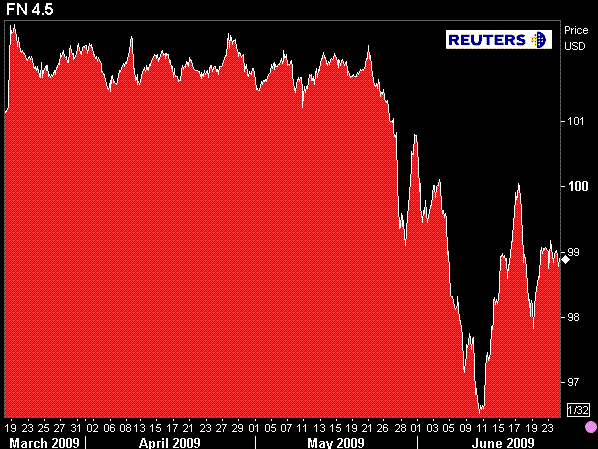
...and mortgage rates increased almost 100 basis points.
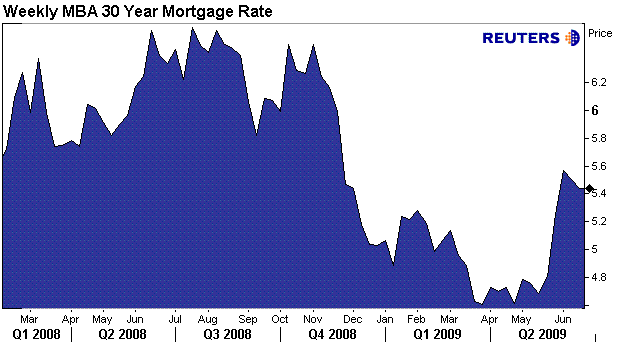
In the blink of an eye the mortgage industry fell into a deep depression and originator pipelines dried up (along with MBS liquidity). Borrowers were left asking "when can I expect to get back that 4.75 no points loan?". All market participants were left looking for leadership...hoping for bad economic data or another bank failure....anything to scare the herd back into risk averse assets...ANYTHING TO PUSH MORTGAGE RATES LOWER!!! Well a month has passed and originator pipelines are still empty as mortgage rates remain elevated.
Financial markets appear to have reached a roadblock....at this point all eyes are on the Fed as stocks and bonds search for guidance. TELL US WHAT'S NEXT BEN BERNANKE!!! IS THE ECONOMY ON THE ROAD TO RECOVERY? ARE MORTGAGE RATES GOING TO COME DOWN???
Each time we have been asked these questions we answer with a roundabout "WE DONT KNOW" ....but each time we are sure to voice our opinion that without an improvement in the housing market a macroeconomic upturn would elude America. This is no secret, Ben Bernanke and the FOMC have stated this time and time again...
...from Ben Bernanke's prepared testimony, June 3, 2009, Before the House Budget Committee:
"We continue to expect overall economic activity to bottom out, and then to turn up later this year. Our assessments that consumer spending and housing demand will stabilize and that the pace of inventory liquidation will slow are key building blocks of that forecast."
....Ben S. Bernanke, the economic outlook, before the Joint Economic Committee, May 5, 2009, U.S. Congress, Washington, D.C.
"We continue to expect economic activity to bottom out, then to turn up later this year. Key elements of this forecast are our assessments that the housing market is beginning to stabilize and that the sharp inventory liquidation that has been in progress will slow over the next few quarters"
....from April 28-29 FOMC Minutes, Staff Economic Outlook
"The key factors expected to drive the acceleration in activity were the boost to spending from fiscal stimulus, the bottoming out of the housing market, a turn in the inventory cycle from liquidation to modest accumulation, and ongoing gradual recovery of financial markets"
...from Federal Reserve's November 25, 2008 press release:
"The Federal Reserve announced that it will initiate a program to purchase the direct obligations of housing-related government-sponsored enterprises (GSEs)..... This action is being taken to reduce the cost and increase the availability of credit for the purchase of houses, which in turn should support housing markets and foster improved conditions in financial markets more generally."
.....Ben S. Bernanke 2009 Credit Markets Symposium, April 3, 2009 Charlotte, North Carolina
"Over time, lower mortgage rates should help to improve conditions in the housing market, whose persistent weakness has had a major impact on economic and financial conditions more broadly, and will improve the financial condition of some households by facilitating refinancing"
Well lets take a deeper look at recent housing data...
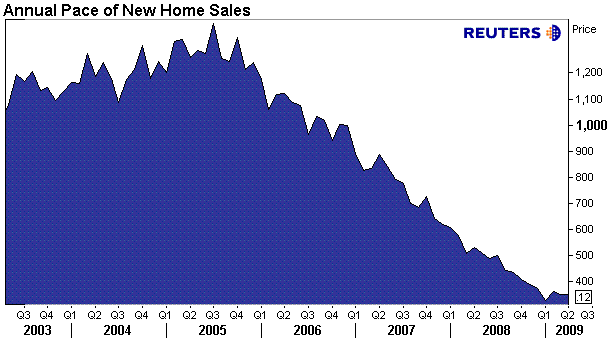
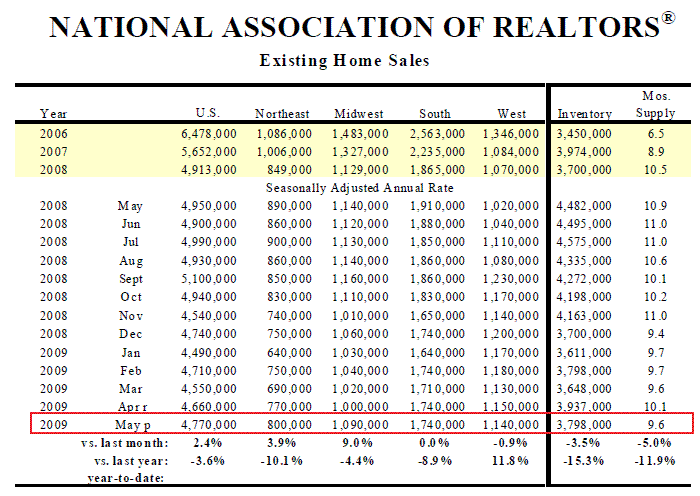
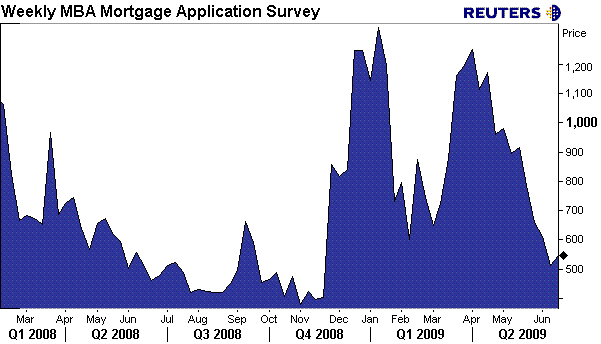
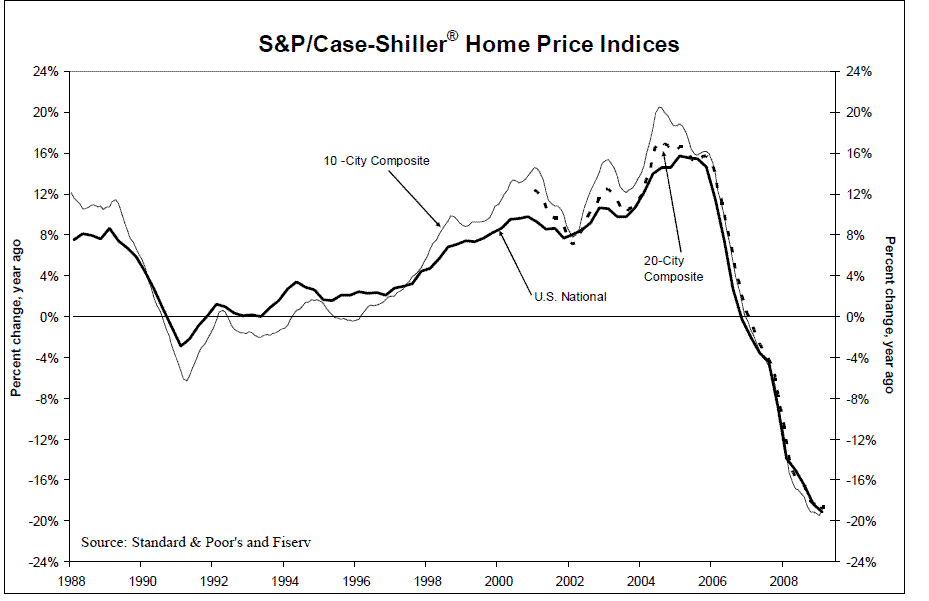
OK...looking at the charts it does appear that the Fed's low mortgage rates initiative has helped stabilize the housing market. Most indicators appear to have hit bottom.This is mostly thanks to...let me quote the NAR:
"Historically low mortgage interest rates clearly drew buyers into the market, and housing remains very affordable even with a recent uptick in rates," he said. "First-time buyers also are being drawn off the sidelines by the $8,000 tax credit, which is helping to absorb inventory.
Originators, let me ask you, have your monthly closings slowed in the past 45 days? Hows your commission check look this month so far? Recent MBS supply would indicate that lending activity has slowed down considerably.
SO WHAT'S ALL THIS HAVE TO DO WITH TODAY'S FOMC STATEMENT????
April 29 FOMC STATEMENT
Information received since the Federal Open Market Committee met in March indicates that the economy has continued to contract, though the pace of contraction appears to be somewhat slower. Household spending has shown signs of stabilizing but remains constrained by ongoing job losses, lower housing wealth, and tight credit. Weak sales prospects and difficulties in obtaining credit have led businesses to cut back on inventories, fixed investment, and staffing. Although the economic outlook has improved modestly since the March meeting, partly reflecting some easing of financial market conditions, economic activity is likely to remain weak for a time. Nonetheless, the Committee continues to anticipate that policy actions to stabilize financial markets and institutions, fiscal and monetary stimulus, and market forces will contribute to a gradual resumption of sustainable economic growth in a context of price stability.
In light of increasing economic slack here and abroad, the Committee expects that inflation will remain subdued. Moreover, the Committee sees some risk that inflation could persist for a time below rates that best foster economic growth and price stability in the longer term.
In these circumstances, the Federal Reserve will employ all available tools to promote economic recovery and to preserve price stability. The Committee will maintain the target range for the federal funds rate at 0 to 1/4 percent and anticipates that economic conditions are likely to warrant exceptionally low levels of the federal funds rate for an extended period. As previously announced, to provide support to mortgage lending and housing markets and to improve overall conditions in private credit markets, the Federal Reserve will purchase a total of up to $1.25 trillion of agency mortgage-backed securities and up to $200 billion of agency debt by the end of the year. In addition, the Federal Reserve will buy up to $300 billion of Treasury securities by autumn. The Committee will continue to evaluate the timing and overall amounts of its purchases of securities in light of the evolving economic outlook and conditions in financial markets. The Federal Reserve is facilitating the extension of credit to households and businesses and supporting the functioning of financial markets through a range of liquidity programs. The Committee will continue to carefully monitor the size and composition of the Federal Reserve's balance sheet in light of financial and economic developments.
DO YOU SEE ANY HOUSING SPECIFIC VERBIAGE IN THE PAST STATEMENT??? NO, no you dont.
WELL IT APPEARS THAT HOUSING IS STABILIZING. WHY DOES THE FED NEED TO GET SERIOUS ABOUT HOUSING?
...because there are over 14.5 million unemployed Americans and no noticeable signs of job creation in the labor market.
AND THIS...
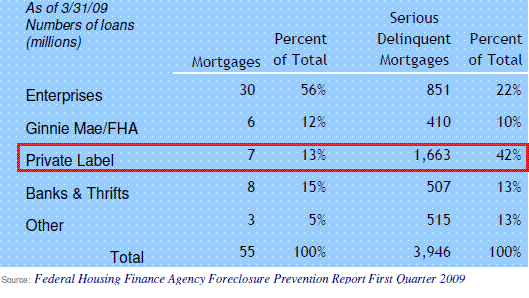
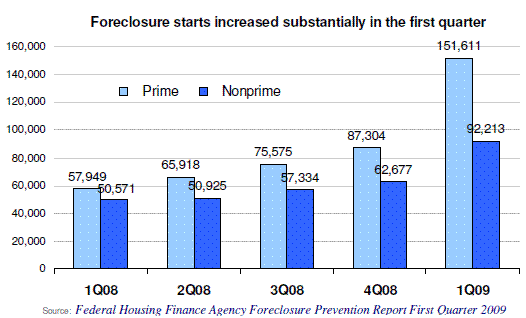
It is quite obvious that the Federal Reserve's economic outlook is heavily reliant on the stabilization of the housing market. In order to facilitate this process the Fed has dramatically reduced the cost of borrowing in an effort to increase the flow of credit within the banking system.That is until recently when the Federal Reserve lost control over the long end of yield curve as traders began to demand higher yields to offset inflation worries and a growing supply of Treasury debt (as taxpayer revenues fall with unemployment). Will the economic stabilization (or whatever choose to call it) be possible without a housing recover?
NO
Will a housing recovery be possible if morgage rates continue to increase?
Dont know, but I think we all know housing is weak, we all know that HVCC is making it weaker, we all know that underwriting standards are still tightening, we all know how useful the HASP have been, we've all heard borrowers say they are going to wait it out and rent....WE ALL KNOW HOW WEAK HOUSING REALLY IS and WE ALL KNOW THAT ADDING ANOTHER ROADBLOCK TO THE RECOVERY (higher mortgage rates) WILL NOT ASSIST IN THE PROCESS!!!
The problem is that the rest of the world is quite clued into this yet...today we need the Fed to address that problem. We need the Fed to broadcast that HOUSING REMAINS WEAK...and unless borrowing costs are at "record lows" a housing recovery will be muted (besides the speculative buyers who can afford the extra $50, $100, $200, $500 in their payment or just pay cash). Barring all else, the Fed's recent non traditional policy statements need to put a special focus on housing...the herd needs to get it through their head that without a recovery in housing the economy will stagnate in its own filth.





